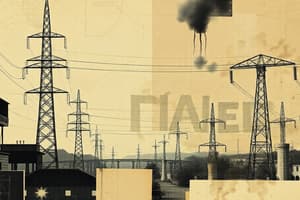Podcast
Questions and Answers
What is the primary characteristic of alternating current?
What is the primary characteristic of alternating current?
- It periodically reverses direction (correct)
- It flows in one direction only
- It is typically used in electronic devices
- It has a constant voltage
Which of the following materials would allow the least amount of current to flow?
Which of the following materials would allow the least amount of current to flow?
- Glass (correct)
- Rubber
- Silicon
- Copper wire
What is the unit of measurement for conductance?
What is the unit of measurement for conductance?
- Ohms (Ω)
- Volts (V)
- Amperes (A)
- Siemens (S) (correct)
What is the purpose of electrical grounding?
What is the purpose of electrical grounding?
What is the unit of measurement for current density?
What is the unit of measurement for current density?
What is the primary factor that drives current flow?
What is the primary factor that drives current flow?
What is the term for a hazard that can occur when a person comes into contact with a live electrical circuit?
What is the term for a hazard that can occur when a person comes into contact with a live electrical circuit?
What is the device used to measure current?
What is the device used to measure current?
Flashcards are hidden until you start studying
Study Notes
Definition
- Electrical current: the flow of electrons through a conductor, such as a wire
- Measured in amperes (A)
Types of Current
- Alternating Current (AC):
- Periodically reverses direction
- Commonly used in power distribution systems
- Can be transformed to different voltages
- Direct Current (DC):
- Flows in one direction only
- Typically used in electronic devices
Current Flow
- Conductors: materials that allow current to flow (e.g., copper wire)
- Insulators: materials that resist current flow (e.g., rubber, glass)
- Semiconductors: materials with intermediate conductivity (e.g., silicon)
Factors Affecting Current
- Voltage: the force that drives current flow
- Resistance: opposition to current flow, measured in ohms (Ω)
- Conductance: the ease with which current flows, measured in siemens (S)
Current Measurement
- Ammeter: a device used to measure current
- Current density: the amount of current flowing through a given area, measured in amperes per square meter (A/m²)
Safety Considerations
- Electric shock: a hazard that can occur when a person comes into contact with a live electrical circuit
- Electrical grounding: a safety measure to prevent shock by providing a safe path to ground for electrical currents
Electrical Current
- Electrical current is the flow of electrons through a conductor, such as a wire, and is measured in amperes (A).
Types of Current
- Alternating Current (AC) periodically reverses direction, is commonly used in power distribution systems, and can be transformed to different voltages.
- Direct Current (DC) flows in one direction only and is typically used in electronic devices.
Current Flow
- Conductors, such as copper wire, allow current to flow.
- Insulators, such as rubber and glass, resist current flow.
- Semiconductors, such as silicon, have intermediate conductivity.
Factors Affecting Current
- Voltage is the force that drives current flow.
- Resistance, measured in ohms (Ω), opposes current flow.
- Conductance, measured in siemens (S), is the ease with which current flows.
Current Measurement
- An ammeter is a device used to measure current.
- Current density, measured in amperes per square meter (A/m²), is the amount of current flowing through a given area.
Safety Considerations
- Electric shock is a hazard that can occur when a person comes into contact with a live electrical circuit.
- Electrical grounding is a safety measure to prevent shock by providing a safe path to ground for electrical currents.
Studying That Suits You
Use AI to generate personalized quizzes and flashcards to suit your learning preferences.




